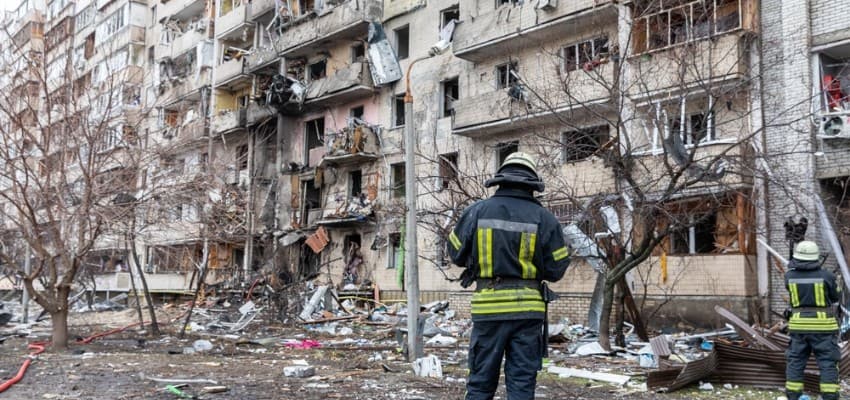|
|
Content Assessment: A Culmination Point: Ukraine Conflict Assessments in Maps (March 17-19, 2022)
Information - 97%
Insight - 95%
Relevance - 94%
Objectivity - 92%
Authority - 93%
94%
Excellent
A short percentage-based assessment of the qualitative benefit of the post highlighting the recent Ukraine conflict assessments in maps from the Institute for the Study of War.
Editor’s Note: From time to time, ComplexDiscovery highlights publicly available or privately purchasable announcements, content updates, and research from cyber, data, and legal discovery providers, research organizations, and ComplexDiscovery community members. While ComplexDiscovery regularly highlights this information, it does not assume any responsibility for content assertions.
To submit recommendations for consideration and inclusion in ComplexDiscovery’s cyber, data, and legal discovery-centric service, product, or research announcements, contact us today.
Assessment and Maps*
Ukraine Conflict Assessments – An Overview in Maps
- Institute for the Study of War (ISW), Russia Team
- Critical Threats Project (CTP), American Enterprise Institute
General Assessment Background Info
- ISW systematically publishes Russian campaign assessments that include maps highlighting the assessed control of terrain in Ukraine and main Russian maneuver axes.
- These maps augment daily synthetic products that cover key events related to renewed Russian aggression against Ukraine.
One of the most accurate and detailed sources for ongoing updates on the Ukraine crisis is the Ukraine Conflict Update from the Institute for the Study of War. The Institute for the Study of War (ISW) is a 501(c)(3) organization and produces strictly non-partisan, non-ideological, fact-based research. ISW seeks to promote an informed understanding of war and military affairs through comprehensive, independent, and accessible open-source research and analysis. ISW’s research is made available to the general public, military practitioners, policymakers, and members of the media. Providing a daily synthesis of key events related to the Russian aggression against Ukraine, ISW updates may be beneficial for cybersecurity, information governance, and legal discovery professionals as they follow the business, information technology, and legal trends and trajectories impacted by the current Ukraine conflict.
Russian Offensive Campaign Assessment on March 19, 2022
Ukrainian forces have defeated the initial Russian campaign of this war. That campaign aimed to conduct airborne and mechanized operations to seize Kyiv, Kharkiv, Odesa, and other major Ukrainian cities to force a change of government in Ukraine. That campaign has culminated. Russian forces continue to make limited advances in some parts of the theater but are very unlikely to be able to seize their objectives in this way. The doctrinally sound Russian response to this situation would be to end this campaign, accept a possibly lengthy operational pause, develop the plan for a new campaign, build up resources for that new campaign, and launch it when the resources and other conditions are ready. The Russian military has not yet adopted this approach. It is instead continuing to feed small collections of reinforcements into an ongoing effort to keep the current campaign alive. We assess that that effort will fail.
Ukraine Conflict Update on March 18, 2022
- Russian and Ukrainian negotiators have likely agreed that Ukraine will not join NATO, but the Kremlin maintains maximalist demands of Ukraine that it is unlikely to drop in the coming weeks.
- Russian media continues to amplify government officials and “experts” who falsely claim that the United States is preparing to wage biological or chemical war on Russia.
- Russian President Vladimir Putin blamed Ukraine for allegedly developing nuclear weapons with foreign assistance and falsely claimed that Ukraine planned to conduct a nuclear attack against Russia.
- The Kremlin continued to claim that Ukraine is the aggressor and that Russia’s invasion is going according to plan and will soon accomplish its objectives.
- The Kremlin downplayed the impact of sanctions on the Russian economy and took additional steps to mitigate and counter their effects.
- Belarusian President Alexander Lukashenko stated on March 15 that Belarusian soldiers will not enter Ukraine and accused Ukraine of trying to drag Belarus into the war.
- The Kremlin is kidnapping local leaders to set conditions for controlling and subduing occupied Ukrainian territory.
- NATO defense ministers agreed to deploy additional troops to NATO’s eastern borders but reiterated that the Allies will not create a no-fly zone over or send troops to Ukraine.
- Russian President Vladimir Putin asked China for military and economic support for the war in Ukraine. China has neither confirmed nor denied whether they will provide aid to Russia.
Chronology of Maps from March 17 – 19, 2022 (Ukraine, Kyiv, and Mariupol) – Mouseover to Scroll
Ukraine Conflict Maps - 031722 - 031922Read the latest Ukraine Conflict updates from the Institute for the Study of War
* Shared with direct express permission from the Institute for the Study of War (ISW).
About the Institute for the Study of War Research Methodology
ISW’s research methodology relies on both primary and secondary sources, enabling researchers to develop a comprehensive understanding of the situation on the ground. In order to analyze military and political developments in any given area, ISW’s research analysts must wholly understand the systems of enemy and friendly forces. They must also understand the population demographics, physical terrain, politics, and history of that area. This lays the analytical foundation for understanding the reasons for particular developments and fulfilling their assigned research objectives. ISW analysts also spend time in places like Iraq, Afghanistan, and elsewhere in order to gain a better understanding of the security and political situation and to evaluate the implementation of current strategies and policies. Our researchers compile data and analyze trends, producing a granular analysis of developments in areas of research, producing an accurate, high-resolution, timely, and thorough picture of the situation. ISW’s research methodology guarantees its success and commitment to improve the nation’s ability to execute military operations, achieve strategic objectives, and respond to emerging problems that may require the use of American military power.
About the Institute for the Study of War
The Institute for the Study of War advances an informed understanding of military affairs through reliable research, trusted analysis, and innovative education. We are committed to improving the nation’s ability to execute military operations and respond to emerging threats in order to achieve U.S. strategic objectives. ISW is a non-partisan, non-profit, public policy research organization. Learn more, get involved, and contribute today.
Additional Reading
- [Annual Update] International Cyber Law in Practice: Interactive Toolkit
- Data Embassies: Sovereignty, Security, and Continuity for Nation-States
Source: ComplexDiscovery


























